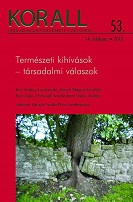A 14. század eleji megye kereskedelemirányító feladatai és a honor rendszer
The Trade Controlling Roles of Counties and the Honor System in Early Fourteenth-Century Hungary
Author(s): Péter Haraszti SzabóSubject(s): History
Published by: KORALL Társadalomtörténeti Egyesület
Summary/Abstract: Out of all the medieval kings of Hungary, Charles I of Anjou was the most com- mitted to developing the economy. As the present study suggests, the system of awarding honors was directly linked to his economic policy and honors were not bestowed upon people on an ad hoc basis, merely in order to generate revenues. While the author does not question the importance of the honor system as far as power is concerned, the study refines our understanding of it. It suggests that the recipients of county seats or castle positions were people who had retrieved those from oligarchs for the crown. Pál Engel’s archontology points out that a limited group of counties came to be held by magnates, and that there was only a partial link between the honor system and the king’s international and military conflicts or lands formerly held by magnates. However, further research reveals that over half of all royal castles were located in such lands, and nearly 77% of city charters and 90% of all charters granting special protection in this period originated there as well. Collecting royal customs was the privilege of the honor holders, but this also carried the added responsibility of maintaining roads, bridges and river crossings and protecting itinerant merchants and travellers. This fact was recorded in the Hungarian-Bohemian trade pact, as well as several surviving letters of safe conduct. Counties had the legal capacity to perform these duties, which is attested to by a 1338 charter by the comes of Hont as well as some Árpádian laws. We have surviving sources about the practical implementation of the duty of protection for nearly all the main roads of the country. These sources illustrate the king’s personal endeavours to improve the situation of his long- suffering royal coffers. Internal customs that were still extant at this time, and especially the foreign trade custom called tricesima, were also both linked to the honor system and generated significant revenues for the crown. However, the system also helped to recover the royal fiscus indirectly by the growth of cities and their increasing tax payments to the king. The question remains, however, whether this economic volume was Charles I’s own initiative or a pattern across the entirety of the system. To answer this, further research into the origins of the honor system and its history after the reign of Charles I would be necessary.
Journal: Korall - Társadalomtörténeti folyóirat
- Issue Year: 2013
- Issue No: 53
- Page Range: 133-159
- Page Count: 27
- Language: Hungarian

